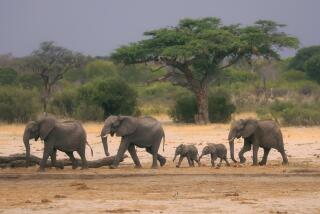Elephant Poaching Down, Conservationist Says : Wildlife: Richard Leakey tells UCI audience that animals’ future is still troubled as growing population puts stress on Africa’s limited parkland.
- Share via
IRVINE — Kenyan wildlife conservationist Richard Leakey said Wednesday at UC Irvine that poaching of elephants has declined dramatically in Africa, but other problems continue to face the giant mammals.
From a rate of more than 3,000 a year in the mid-1980s, poaching has declined to less than 50 a year today, Leakey said. Pressures from growing human populations, however, cloud the animals’ future.
Leakey, 49, has found both celebrity and controversy in each of his public careers, as a conservationist who helped establish a worldwide ban on the sale of ivory, and as a paleo-anthropologist whose inquiries into the origins of humankind have extended the pioneering work of his parents, famed fossil hunters Louis and Mary Leakey.
The past year has been difficult for Leakey. Last June, a small plane he was piloting crashed outside Nairobi. His lower legs were crushed, and both were later amputated below the knee and he was later fitted with prosthetics. On Wednesday, he walked to the podium without the aid of a cane, and said in a brief interview before the lecture that he is “doing very well.”
Political troubles have followed his physical setbacks. Last month, he tendered his resignation as head of the Kenya Wildlife Service, a post he has held since 1989. Senior government officials had accused him of corruption and mismanagement, charges he vehemently denied at the time of his resignation.
Donor organizations (including the World Bank), international conservation groups and Kenyan tour operators have come to Leakey’s defense. The resignation has been characterized as an ultimatum to Kenyan President Daniel arap Moi to back Leakey or fire him, but Moi has yet to act.
Leakey’s 1989 appointment to the Kenya Wildlife Service was a surprise to many, but he pursued the job aggressively. He instituted a shoot-to-kill order to fight poachers, sought to curb corruption with widespread firings in the wildlife agency, and led the call for the worldwide ivory ban.
Some of his methods have been criticized, both within Kenya and internationally, but he has numerous supporters throughout the conservation community. In his own defense, Leakey points to the bottom line: Since his appointment in 1989, elephant poaching in Kenya has been virtually eliminated.
In his talk, Leakey attributed the decline in poaching largely to a shift in public sentiment against the use of ivory.
Rebounding elephant populations are putting increased pressures on limited parkland in Kenya and elsewhere, leading to complex management problems, Leakey said.
Overall, however, Kenya has “turned a negative situation into a positive situation,” Leakey said.
Leakey was born in Nairobi, Kenya, in 1944 and often accompanied his parents as they worked at Tanzania’s Olduvai Gorge, where they made startling fossil discoveries in the late 1950s and through the 1960s. Louis died in 1972, but Mary continues to work in the field.
Richard Leakey made his first fossil discovery, the skull of an extinct pig, at age 6, but later vowed not to follow in his parents’ footsteps and became a safari guide.
However, at age 23 and largely untrained, he started an excavation at Koobi Fora, near the shores of Lake Turkana in northern Kenya, and uncovered an extremely rich trove of early human remains. Perhaps the most significant find was the so-called “Turkana Boy” in 1984. About 1.5 million years old, it is by far the most complete skeleton ever discovered of Homo erectus, widely accepted as the most immediate ancestor to modern humans, Homo sapiens.
His interpretations of the human fossil record have sometimes put him at odds with colleagues in the anthropological field, but then he is no stranger to controversy. He has outlined his discoveries and theories in several books, most recently “Origins Reconsidered,” published in 1992.
Leakey has not actively pursued anthropology since his appointment to the wildlife position in Kenya, but his wife Meave is a paleontologist with the National Museums of Kenya.
More to Read
Sign up for Essential California
The most important California stories and recommendations in your inbox every morning.
You may occasionally receive promotional content from the Los Angeles Times.












